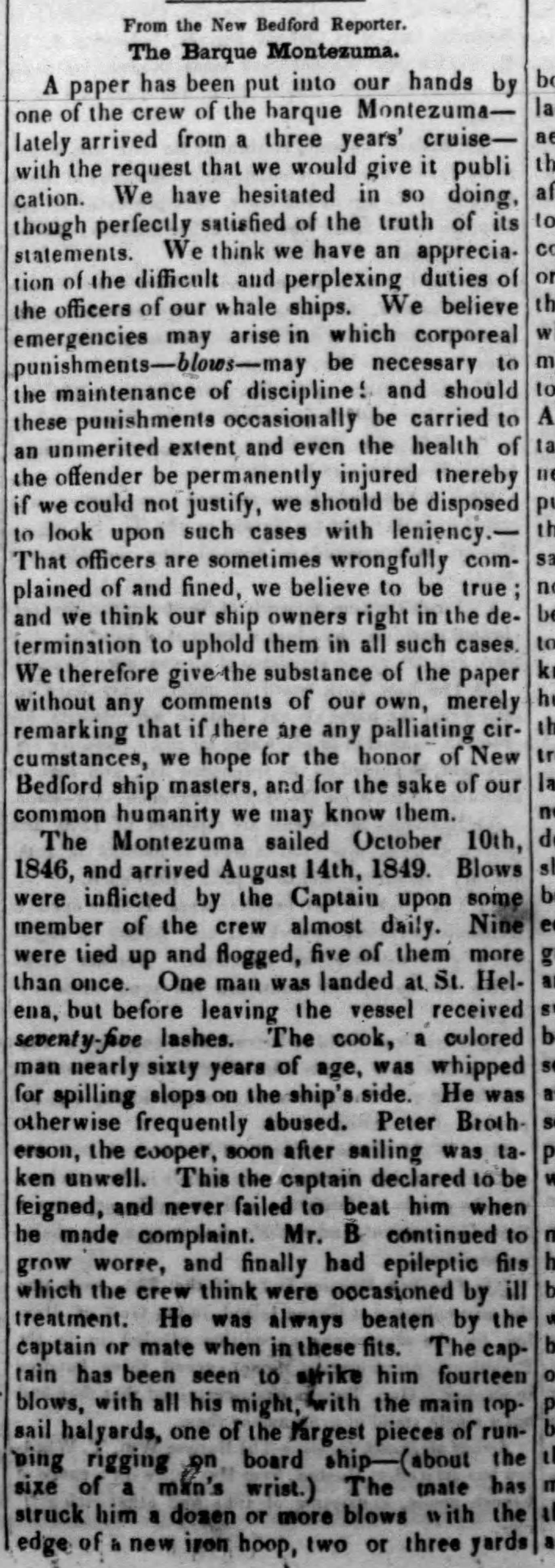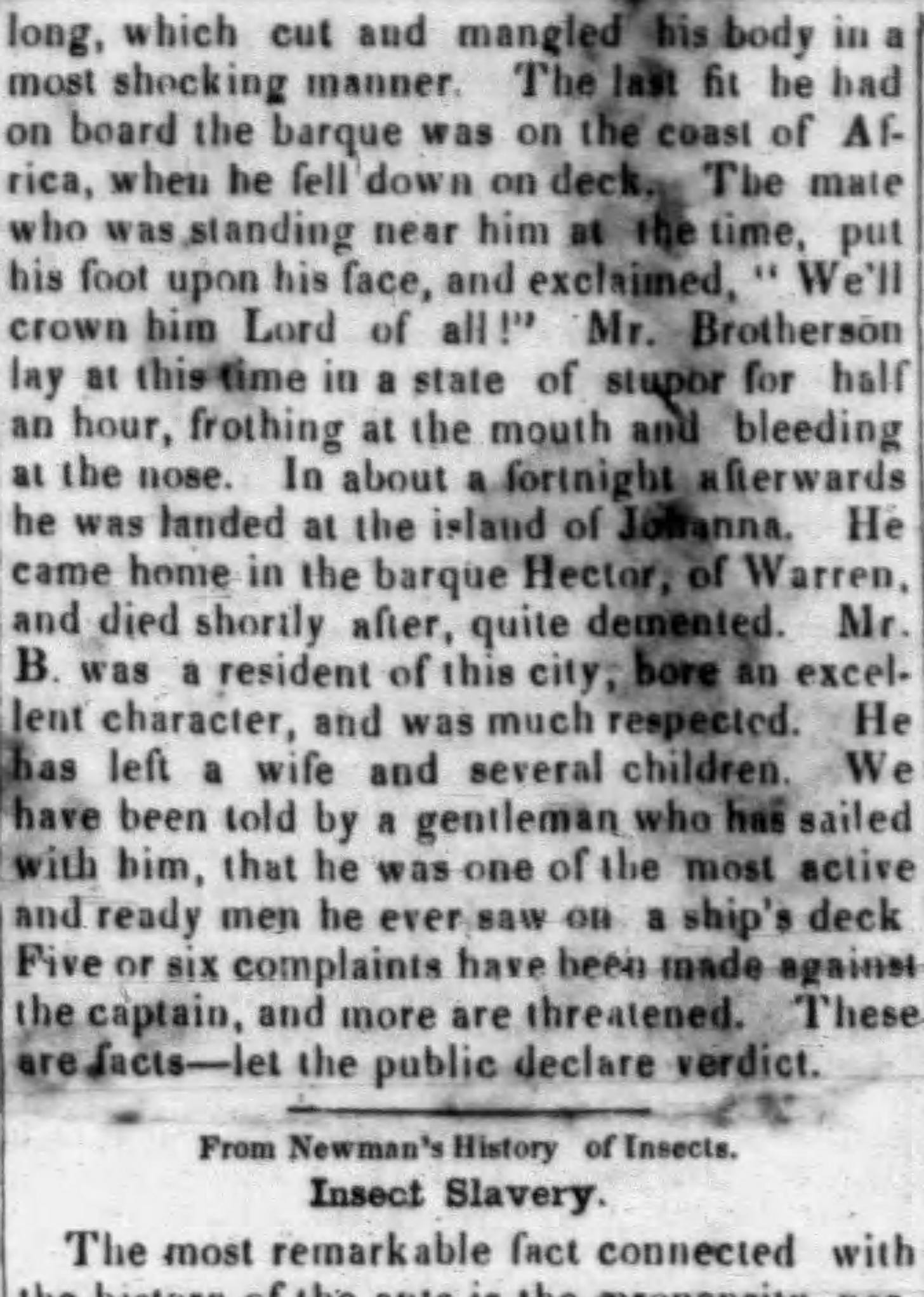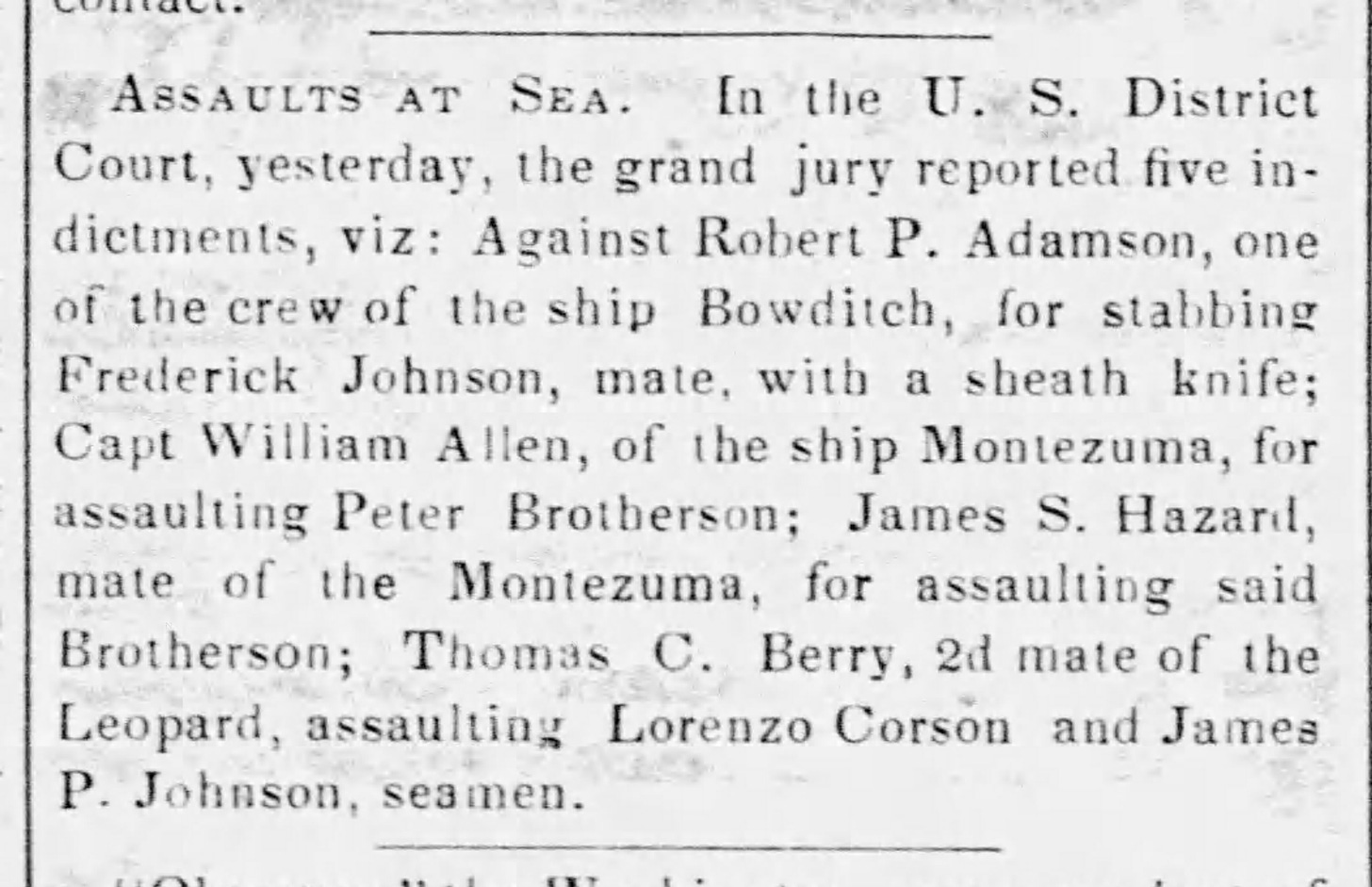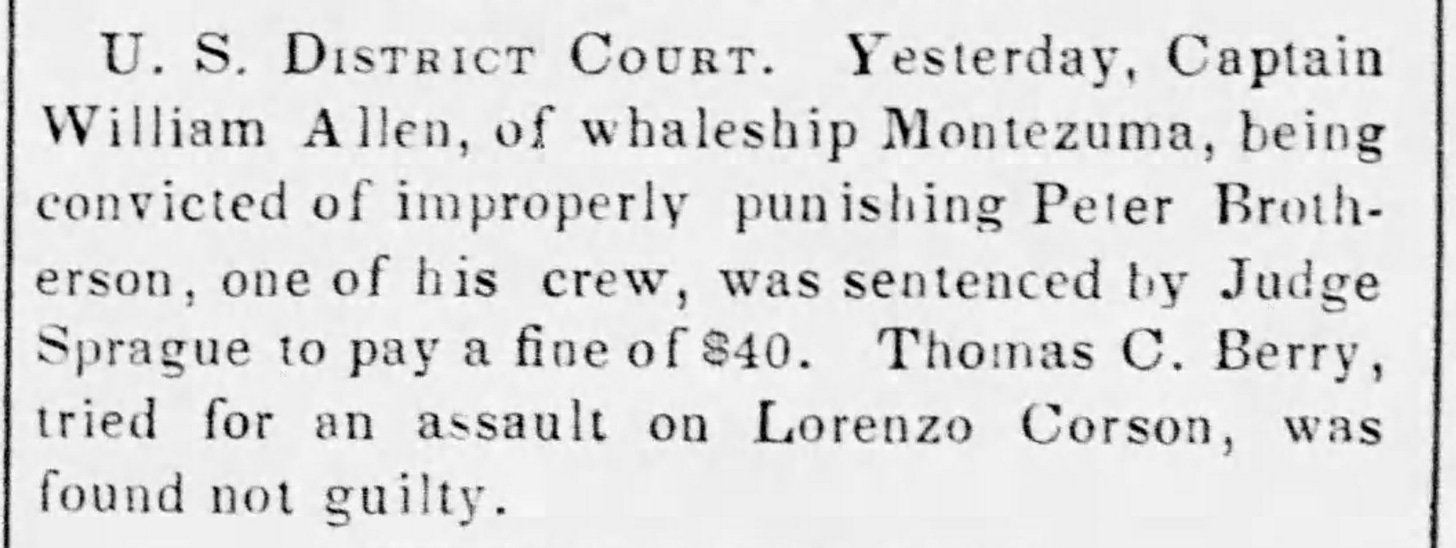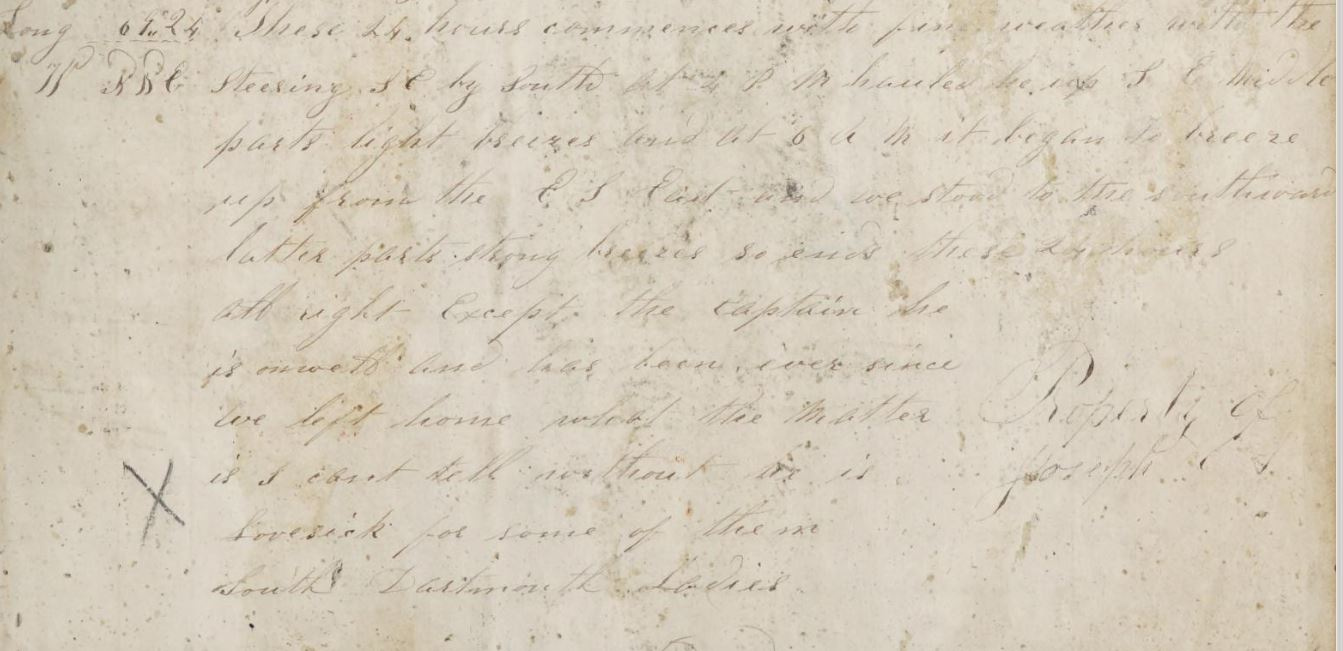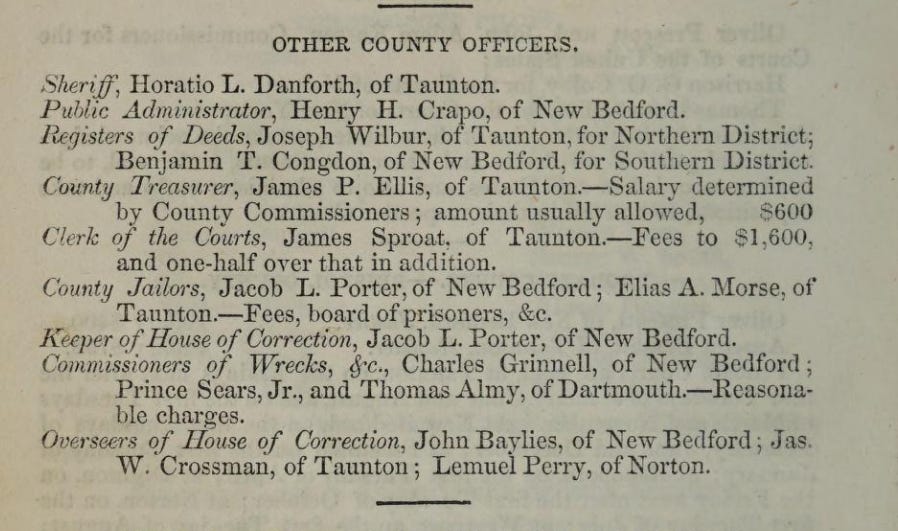Sometimes, I like to play a game. I find something. An off-hand mention in a case, a statement in an article. A person, an event, a controversy. Something that resonates. Something that would leave a trace. Then, I check to see if it has been written about academically, or online.
If it hasn’t — because if it has, that’d be cheating — I run it down to the ground. Until I run out of sources. Until there’s nothing left to know.
On October 1, 1849, Judge Peleg Sprague decided a case filed in the United States District Court for the District of Massachusetts, styled1 Crapo v. Allen.
The written decision is short. Fewer than six hundred words. Cut out the law, and we’re down to one hundred and twenty-five:
This is a libel by the administrator of Peter Brotherson, deceased, alleging that the intestate was one of the crew of the bark Montezuma, of which the respondent2 was master, on a whaling voyage, and that during such voyage the respondent treated Brotherson with great cruelty, specifying several particulars, and among them, an aggravated assault and battery.
…
I think that those claims in the libel, which rest upon mere personal torts, cannot be sustained. But there are other allegations in the libel, namely, withholding suitable medicines in sickness, and putting the intestate ashore in a foreign country. These may be deemed violations of the contract of hiring, and an action therefor may be maintained by the administrator. Decree for the libellant for $75 and costs.
What does Judge Sprague tell us?
There was a man named Peter Brotherson. As of October 1, 1849 — or sufficiently in advance of — Mr. Brotherson was dead. He died without a will.3 At some point, Mr. Brotherson was employed on the whaling bark “Montezuma,” captained by the respondent, “Allen.4”
Judge Sprague doesn’t say, but we can infer — because this was a federal court, for the District of Massachusetts — someone in the case had a connection to Massachusetts.
Death records from this era are mostly digitized, and accessible5. And Mr. Brotherson’s name is wonderfully unique. Mr. Brotherson’s death was recorded by the town clerk in New Bedford.
Based on the above, I think this may be our Peter Brotherson. Not just because he died at about the right time, in the right state, but because he died in New Bedford, Massachusetts6.
New Bedford is known for a handful of things, but one of them — the one they’d most like you to remember — is its past as a hub for whaling.
Using the name Peter Brotherson, and the ship, Montezuma, we find a newspaper article from September 1, 18497, originally published in the New Bedford Reporter:
A horror.
So bad, it turned out, that not all consequences were civil:
Not only indicted, but convicted:
After all that. We’re still missing a big piece of the puzzle.
Captain William C. Allen: Dead
“Respondent.” “Allen.” Captain. Who is this sadistic fuck? Where is his grave? How did he end? Who can we blame.
His first name doesn’t appear in the court decision as published on Westlaw. And it doesn’t appear in the article on the Montezuma.
The New Bedford Whaling Museum maintains a searchable database of whaling crews.8
I searched first for Mr. Brotherson, and found him. Alas, New Bedford doesn’t allow you to pull the entire crew list for a voyage. Or at least, I wasn’t able to find an efficient way of doing it.
There are, however, other museums. Mystic Seaport9, for example.
And Mystic Seaport lets you search by vessel, and by master. It’s a lovely interface. So much fun. If that’s what you’re into.
William C. Allen.10 That’s the bastard. There’s our villain.
Who is William C. Allen?
I searched for further background in the news. I found none. Nearly on a whim a whim, hoping for nothing more than a city directory, or perhaps a musty index of taxpayers. Instead, I found the ship’s log. Same voyage.
And here’s a little color, showing the character of Captain Allen.
The last three lines read “lovesick for some of those South Dartmouth Ladies.”
South Dartmouth.
Nice and specific.
There was a “Captain William C. Allen,” born in 1816 in Dartmouth, Massachusetts. He’d have been thirty at the start of the voyage. About the right age.
If this is our Captain Allen, he was the fourth of six children born to Benjamin Allen and Hannah Allen, in Dartmouth. Although Captain Allen is buried in South Dartmouth Cemetery, his parents are buried at Apponegansett Friends Cemetery.11
And this “William Allen” happens to be the brother-in-law of Joseph Slocum, who was the Owner’s Agent, and later the owner, of the Montezuma. Which would provide a nice, plausible explanation, for how it is that someone appears to have become ship’s master with little documented whaling experience.
Henry Howland Crapo: Horticulturalist and More
What about Crapo? Who was the “Crapo” in “Crapo v. Allen?”
From the National Archives, I was able to get the full case name, identifying the “Crapo,” who brought suit on behalf of Mr. Brotherson’s heirs at law.
Henry H. Crapo. There is a notable Henry Howland Crapo, born in Dartmouth in 1804. Known in Massachusetts for his interest in horticulture, and in Michigan for being its governor. His papers are collected, by the University of Michigan.12
Interesting. But, actually, feels somewhat implausible, doesn’t it?
A future governor of Michigan? A horticulturalist? He has no discernable connection to the Brothersons.
There must have been another Henry H. Crapo, although there were no convincing traces of one.
I pulled some old city directories. And in those directories, I found an answer:
Public Administrator: Henry H. Crapo, of New Bedford.
People who die intestate — that is, without wills — have “administrators” rather than “executors.” That means, the administrator gathers up the dead person’s property and pays their debts and ensures the orderly distribution of estate property.
If a person dies intestate, and there is no one among their heirs able or willing to serve as an administrator, the county-appointed “public administrator” handles the estate.
And that is what Mr. Crapo did, here.
Based on my experience with public administrators,13 Mr. Crapo didn’t have to file suit, against Captain Allen. There is no rule requiring zealous prosecution and collection of even the most contingent of claims. In fact, given the opinion written by Judge Sprague, the claim brought by Mr. Crapo seemed unlikely to yield a dime.
Why did he do it, though. I don’t have an answer. I have theories.
Some are heroic — perhaps, it was the right thing to do, for the struggling Brotherson family. Peter Brotherson’s wife never remarried. They would have needed something to live on.
Some are pragmatic — perhaps, Mr. Crapo felt it was his duty to satisfy estate creditors. Maybe he saw himself like a bankruptcy trustee, collecting anything necessary to pay over to landlords and doctors and tax collectors.
If there is an answer, it’s in Michigan.
“Styled” means “called, in an official reporter, or as frequently referenced.” Crapo v. Allen is a condensed version of the names of the parties to the suit, in the order they would appear in the “caption” of the case. The “caption” of a case is, essentially, the full name of a case, as it would be set out in court papers.
“Respondent” is one of the terms used for a person, or entity, from whom some relief is sought in court. “Defendant” is another, and most common throughout the United States in both criminal and civil litigation; however, you will still see “respondent” in certain administrative proceedings, arbitration, and older records.
The person seeking relief in a civil proceeding, in the United States, is most often called “Plaintiff.” In this case, because it is so old, the term used is “Libellant.” Another term occasionally used in court, administrative proceedings, and arbitrations, is “Petitioner.”
The reference to an “administrator” and to “intestate” indicates that there was no will. A person who files suit on behalf of an estate, who has been appointed to do so by a court, would be called an “executor” at this time, and right up through about ten years ago. As the uniform probate code has taken hold, the term “personal representative” is more commonly used for both.
Westlaw did not have the full caption for this case. So, on first read, there was no information from which we could learn the first name of either the administrator, Crapo, or the respondent, Allen.
Massachusetts death records, and historic records kept by town clerks, can be found on Familysearch.org. Membership to the site is free, and very worthwhile.
Mr. Brotherson, in a part of the death record I did not include, was identified as a “cooper.” As this aligns with the article quoted next, I am confident that the “intestate” in the court case, the subject of the death record, and the person identified in the article are all the same “Peter Brotherson.”
Of course this came from Newspapers.com, which is not free, but incredibly worthwhile.
It is here: https://www.whalingmuseum.org/online_exhibits/crewlist/search.php
https://research.mysticseaport.org/databases/whaling-voyages/
The middle initial is very, very useful here, as one of the most famous — to the extent that’s a thing — whaling captains was also a “William” “Allen.”
https://research.mysticseaport.org/nl-whaling-masters/am0102/
Thank you, Find A Grave.
https://findingaids.lib.umich.edu/catalog/umich-bhl-851633
My god, the stories I can’t tell you. Mass. R. Prof. C. 1.6.







